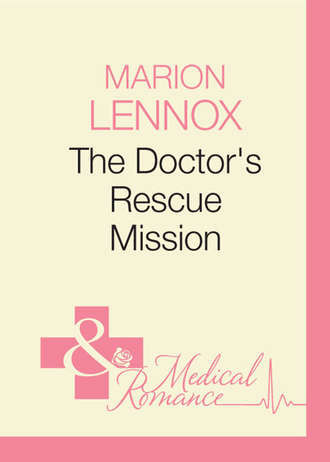
Полная версия
The Doctor's Rescue Mission
Dr Grady Reece played with his mug of coffee and stared at the pieces on his chessboard. He’d beaten Dr Jaqui Ford three times and she’d beaten him five.
He was going out of his mind.
The weather was perfect, and that was half the trouble. Enough rain meant no bushfires. No wind meant no dramas at sea. They were out of the holiday season so people weren’t doing damned fool holiday things. Which meant Air-Sea Rescue was having a very quiet time.
‘Aren’t you glad?’ Jaqui enquired.
‘Why should I be glad? I joined the service for excitement.’
‘So you like people killing themselves?’
‘I didn’t mean that,’ he growled. ‘You know very well that I try my damnedest to stop people killing themselves. And you live on adrenaline just as much as I do.’
‘Yes, but I have had a life,’ Jaqui said mildly. ‘Husband, kids, dogs. I come here for some peace. Yeah, I like the adrenaline rush of thinking we might be saving someone, but for the rest…work is my quiet time.’
Grady smiled at that. Jaqui was in her mid-fifties and was a very competent doctor. She’d only just undertaken the additional training to join Air-Sea Rescue, but already the tales of her tribe of hell-raising adult sons were legion. Everyone knew why Jaqui thought rescuing people in high drama was a quiet life.
‘No, but you,’ Jaqui said insistently. ‘You can’t depend on this for your excitement. Maybe you need kids of your own.’
‘To provide me with drama? I don’t think so.’
‘So you’re not into families?’ Jaqui was probing past the point of politeness, but Grady’s associate was no respecter of boundaries.
‘Not interested,’ Grady growled, hoping to shut her up.
It didn’t.
‘You’re not gay?’
That got a grin. ‘What do you think?’
‘You never know these days,’ Jaqui said, moving her bishop with a nonchalance that told Grady she was hoping he might not notice she was threatening his queen. ‘Someone once told me you can detect gayness if a man wears one earring, but my sons wear one, two or sixteen, depending on how the mood takes them. As they also seem to have one, two or sixteen girlfriends, depending on how the mood takes them, who would know anything at all? So…’ She sat back and subjected him to intense scrutiny. ‘Not gay. Not seriously involved. There’s never been a woman who looked like being long term?’
‘Cut it out.’
‘Max told me you were really smitten once. A lady called Morag.’
Max was their pilot. Max talked too much.
‘Morag and I went out for about a month. Four years ago.’
‘Was that all? I thought it was serious.’
Maybe it was, Grady thought ruefully. He’d hardly thought through the consequences at the time but after she’d gone…he’d missed her like hell. Not that there’d been any choice in the matter. She’d buried herself in some remote little settlement and that surely wasn’t the life for him.
So what? Why was he thinking of Morag now? he asked himself. He’d moved on. He’d dated. Morag had been a one-month relationship followed up by a letter of sympathy after her sister had died. It had been an intense letter that had taken him a long time to draft, but she’d never answered. So…
So one of these days a lady would come on the scene who’d make him smile as Morag had made him smile. But with no attachments.
‘You don’t want kids?’ Jaqui asked.
‘Why would I want kids?’
‘You want excitement. Kids equal excitement.’
‘I’ll get my excitement some other way,’ he growled. He moved his queen, removed his hand from the board and then saw the danger. ‘Whoops. Check.’
‘Checkmate,’ Jaqui said sweetly, and then looked up as Max came through the door. One look at their pilot’s face and they knew there were to be no more chess matches that afternoon.
‘What is it?’
‘Code One,’ Max said shortly. ‘Huge. We’re going in first, with back-up on the way. The army’ll be in on this, but, Grady, you’ve been put in charge first off. Tsunami.’
‘A tidal wave,’ Jaqui said incredulously. ‘Where?’
‘Petrel Island. Contact to the island’s completely cut. The first reports have come in from fishing boats that were out to sea when the wave hit. All we know is that there were five hundred inhabitants on the island when a wall of water twenty feet high swept through. God knows how many are left alive.’
It was ten minutes before Morag met anyone at all. She was climbing down as people were climbing up, but the shortest way to high ground wasn’t the track she was on. So her path was deserted. At every step she took her dread increased.
Finally she reached the town’s outskirts, and here she met Marcus. Marcus was the head of the town’s volunteer fire brigade, a brilliant fisherman and a man who normally could be absolutely depended on in a crisis. He looked…lost.
‘Marcus…’
He was at the top of the track she was taking into town, the road leading to the fire station. Or it was the track that had led to the fire station. Marcus was standing where the station had once stood. The flimsy shed had given way completely, and a pile of rubble covered the town’s only fire engine.
Marcus was staring unseeingly at the mess, and he didn’t turn as Morag touched his shoulder.
‘I don’t know where they are,’ he whispered, turning to gaze down at the ruined township.
He was soaked. He’d been caught by the wave, Morag thought, stunned, which meant the water must have washed almost three hundred yards inland. A shallow gash ran down the side of his face, and he looked as sick as she felt.
But they weren’t alone. Above the township was bushland and the bush seemed the extreme of the wave’s reach. Morag turned and looked upward and here was the first good news. People were emerging. They were still obviously terrified, but they were slowly venturing out.
All eyes were still turned toward the sea.
‘Marcus!’ It was a cry of disbelief—of tremulous joy. A woman was running toward them, towing two seemingly scared-witless teenagers after her. Judy. Marcus’s wife. Marcus’s face went slack with relief, and so did Morag’s.
This was Marcus’s family. With Marcus behind her she might get something organised, and now he had his family safe she could start.
Something…
What?
First things first. She had to wait until Marcus had gathered Judy and the kids to him in the hug of a man who’d thought he’d lost everything.
Finally he released them and turned to Morag. ‘S-sorry.’
‘Don’t be sorry,’ Morag said unsteadily. ‘I wouldn’t mind if someone hugged me.’
Judy immediately obliged. Marcus added his mite. Teenage dignity forgotten, the kids joined in, too, until she was squeezed between the four of them. And suddenly she was sobbing like a child.
Two minutes were spent gathering herself, taking strength where she most needed it.
Then…as they finally, tentatively broke away from each other and turned to stare out to sea again, they found space to talk.
‘There’s not likely to be another, is there?’ Marcus asked, and Morag tried to think clearly about the possibility.
‘I don’t know. Maybe. Hubert and Robbie are on lookout with the bell, and Robbie has the best eyes on the island.’
‘Was it you who rang the bell?’ Judy asked, and when Morag nodded she was hugged all over again.
‘Thank God for you, girl. There we all were, like sitting ducks, huddled in the main street waiting to be washed away.’
‘Who was left behind?’
‘God knows,’ Marcus said frankly. ‘I was just climbing into the fire truck, thinking after the tremor I’d pull it clear in case it was needed. I heard your bell, but I was trying to get the engine started. It seemed…important. Then as the bell kept ringing I came out—just as the water surged up. I ran. Even so, I had to grab a fence or I’d have been washed away. Judy, you…’
‘I was with most of them,’ Judy told them. She was still clutching the kids—Wendy, aged fourteen, and Jake, who was sixteen. Normally they wouldn’t be seen dead clutching their mother but they were clutching her just as much as she was clutching them. ‘Most of us got to the bush. If we made it to safety, then I’d guess most people would have. Then I thought you’d be at the fire station, Marcus, so I came.’ She hugged her husband again, and her teenagers hugged, too.
‘There must be casualties,’ Morag whispered, and Marcus nodded.
‘Yeah. Thank God it’s Sunday so the school’s empty.’
The school was on the foreshore. The thought of what might have happened—and hadn’t—was almost enough to steady her.
‘OK.’ Deep breath. Somehow she had to figure out a way forward, though the extent of the calamity was overpowering. But she had four able-bodied people—five, counting herself—and, by the sound of it, the bulk of the townsfolk were safe. She needed to gear up. She needed to think.
‘Let’s get everyone safe first,’ she told them. ‘The cricket ground is on high ground and we can set up the pavilion as a clearing house. Marcus, I want you and Jake to start a house-to-house search—get others involved if you can—and send everyone to the cricket ground. I want everyone settled on high ground as fast as possible. Judy, I want you to make a register so we can see who’s missing. Every person has to report to you.’
She paused and gazed across the village where she could see the roof of her tiny, four-bed hospital. Thankfully it was on high ground but she knew at once that it’d be too small for what lay ahead. Plus, even though it was on high ground, it was low enough for a higher wave to do damage. It’d have to be evacuated.
‘I’ll set up a medical centre in the cricket pavilion,’ she told them. ‘On the way I’ll go past the hospital and make sure everyone’s out and safe. Judy, can you and Wendy come with me and help me carry things? I need supplies, plus the files holding every islander’s records. Wendy, are you able to cross-match names with the list Judy’s making?’ She gave them all a tiny, watery smile. ‘I know. I’m sounding bossy when all we want to do is hug each other. But we need to move. Marcus, that cut—’
‘Can wait,’ he said roughly. ‘I’ve a feeling that’s the least of our problems.’
As if on cue, there was a yell from below them. An elderly man—the village grocer—was running toward them, and his terror reached them before he did.
‘Doc. Doc, thank God you’re safe. Doc, Mavis got caught under water. She’s so cold and limp… Oh, God, Doc… She looks awful. I’ve taken her to the clinic but there’s no one there who can help. Can you come?’
Morag started work right then, and she didn’t raise her head for hours.
So many injuries… She didn’t know how many injuries. She could only focus on what was before her.
She worked first at the clinic, as that was where Mavis was. Morag worked over Mavis with fierce intensity, blotting out the sound of evacuation going on all around her, and blotting out the fact that another wave could come at any time.
But despite her best efforts, the outcome was tragedy. There’d been twenty minutes between immersion and the time Morag saw the elderly grocer’s wife. When Morag reached her, one of the nurses had started CPR but it was no use. The ECG tracing showed idioventricular rhythm. Idioventricular rhythm was almost always irreversible—the last sigh of a dying heart—and this was no exception. Finally Morag stood back, defeated, and she put her arm around the grocer’s shoulders in silent sympathy as he wept for his wife.
But there was no time for Morag to weep. The clinic was almost empty. Every patient and almost all the equipment was gone. They covered Mavis and left her there.
‘This…this place can be the morgue,’ she told one of the men who’d tried to help.
He nodded. ‘We’ll start bringing them in.’
Them? How many? She couldn’t bear to ask. ‘I need to see…to make sure…’
‘If there’s any doubt at all, we’ll bring them to you,’ he told her. ‘But there’s those…well, there’s those where there’s no doubt at all.’
Dear God.
Grim-faced, Morag made her way to the cricket pavilion. Here she found her surgery set up in miniature. Any villager not totally occupied with searching for survivors or helping the injured had been hauled in to help. Marcus and his family were working like a miniature army.
There was no time to wonder. Work was waiting everywhere.
Louise, a middle-aged nurse who usually acted as Morag’s receptionist, had decreed herself triage sister and nothing got near Morag unless she said so. That meant Morag nearly missed seeing tiny Orlando Salmon. Her next tragedy.
Orlando had been held in his mother’s arms when the water had slammed them from one side of the road to the other. Angie Salmon was left with bruising, but her tiny son was dead in her arms. Louise would have deflected her from Morag—Morag had so much on her hands that the clearly dead could no longer be her business—but Morag saw them out of the corner of her eye as she was treating a compound fracture, and the look on Angie’s face had her move instinctively to help.
Once again, there was nothing constructive she could do. But Angie had to hear from a doctor that her little son was really dead. She had to watch as Morag took the time to examine the tiny child with love, and show Angie what had killed him. It had been fast. He’d died instantly in his mother’s arms.
Explaining was all Morag could do, and it was all she had time for. There was no time for comfort. There were urgent cases waiting, but as Morag turned away she found herself choked again with tears. She and Angie had gone to school together. Angie had been the biggest tomboy on the island. She had four more kids, and each one was loved to bits.
Damn.
She needed Robbie, she thought bleakly. She desperately needed to hug her own little Robbie, but there was no time.
And she was depending on Robbie. They all were. He was the village eyes. Someone else had gone up on the ridge now, carrying the strongest field glasses they could find, but she knew that Robbie’s sharp eyes would be behind those glasses.
Searching for another wave.
She couldn’t think of another wave.
Morag worked and worked. Every time she turned around there was more need. Fractures, lacerations, grief…
Then about four hours after the water hit, they brought Sam Crane in, carrying him in on a brightly painted door that looked like it had once been entry point to one of the village’s more substantial houses.
Louise saw Sam as the stretcher bearers reached the top of the stairs, and this time she had no hesitation in bringing him to Morag’s immediate attention. Morag turned from the man she’d been treating and flinched. Dear heaven. So much blood.
‘We found him round the back of the harbour,’ Marcus told her. ‘He was working on his boat when it hit. The boat ended up smashed on the harbour wall and we found him underneath. It’s taken six of us to get the boat off him. As soon as we got the boat off, he started bleeding like a stuck pig. We’ve applied pressure but…’
But what? She was lifting the rough blanket way, searching for the source of the bleeding. And here it was.
‘Boat crushed his leg,’ Marcus told her. ‘What’ll we do?’
His leg was lost. That much was unmistakable. What was left was a mash of pulp and splintered bones. The only positive thing was that his leg had been crushed so thoroughly that the blood vessels themselves must have been crushed. With a wound like this she’d expect spurting blood and almost immediate death, but somehow, hours after the wave, he was still alive.
Not for long, though. Blood was oozing across the door and onto the pavilion floor.
‘We need blood. Plasma. Saline.’
‘We’re just about out.’ Irene, the island’s midwife, turned from applying a pressure bandage to a small boy’s thigh. ‘I could use some here.’
‘We need to set up a blood bank.’ Morag was staring down at Sam’s leg in dismay. She had two trained nurses: Louise and Irene. That meant there were three people with medical skills on the entire island. That was it. How could she cope with this? Sam needed his leg amputated right now if he was to live—but she had no anaesthetist. Her nurses would be needed to take blood. The sort of surgery she was envisaging was horrific, but if she didn’t start now, Sam would die almost straight away.
Triage. Priorities. Someone else was calling out for her from below. The child Irene was working on really needed Morag’s attention. Maybe Sam would have to be…
‘Just cut it off, Doc,’ Sam said weakly, reaching out and taking her hand. ‘I know it’s a mess. I can get by on one leg.’
‘You can do anything, Sam,’ she said in a voice that wasn’t the least bit steady. She gripped Sam’s hand and she wasn’t sure who was gaining strength from who. ‘Sam, I’m going to give you enough painkiller to block things out until we can sort out how best to cope with this.’
‘But the leg has to come of?’
‘Yes, Sam. The leg has to come off.’
‘Let’s get on with it, then.’
‘Sure.’ She loaded a syringe and injected morphine. She set up an IV line and watched as Sam drifted into sleep. Or unconsciousness. The combination of shock, blood loss and morphine meant he could no longer stay with them.
Irene was watching her. As Sam’s hand loosened its grip and she stepped back, she found everyone was watching her.
The huddle of people in the pavilion were shocked past belief. Any islander who was fit and not needed to take care of their own family had been co-opted into helping with medical care. But in this tiny settlement everyone knew everyone, and the entire island was like an extended family.
So far the death count from this afternoon was ten and rising. They’d worked so far in numbed disbelief but suddenly that numbness had disappeared. Every single one of them knew what Morag was facing now.
She needed to turn away from Sam and give her attention to someone she could save.
She needed to give up on the impossible.
She couldn’t. She just…couldn’t.
‘Irene, if I talk you through the anaesthetic…’ she managed, and Irene nodded.
‘I’ll try.’
They both knew it was hopeless.
‘Is this the medical centre?’
The voice from down on the cricket ground was strong and insistent, different to the frantic cries for help they’d been hearing. Morag turned, momentarily distracted, knowing she’d reached the end of her resources.
But this was no islander calling for help. They’d been so caught up in the appalling drama that no one had noticed the approach of a small group of yellow-overalled outsiders.
Outsiders.
Help.
Morag looked down at the cluster of people below her. They looked unreal. Like aliens from space. Every islander was mud-coated, battered and torn, either from their own meeting with the wave or from hauling others from the rubble. But these newcomers were clean, purposeful, dressed to work and work hard.
Where had they come from?
‘The helicopter,’ someone whispered. ‘The fishing boats radioed the mainland for help. A helicopter landed ten minutes back.’
Morag hadn’t heard any helicopter, but she had been so focused on urgent need that she’d heard nothing.
She stared down at the group of six. From this distance she couldn’t tell what sex they were—who they were—but they were the first glimmer of the outside world. The first glimmer of sanity.
‘Is anyone a doctor?’ she called without much hope, but a tall, yellow-overalled figure separated from the bunch and strode up the stairs three at a time.
‘I’m a doctor and so is Jaqui,’ he called as he climbed. ‘Ron and Elsey are paramedics and Doug’s here to assess priorities so we can get the personnel we need from the mainland. Who’s in charge?’ His words were cutting through the confusion and the chaos, and his tone was measured to command.
‘I guess I am,’ Morag said unsteadily, glanced despairingly down at Sam. ‘If you’re a doctor…I need help. So much help…’
‘You have it.’ The man passed the group clustered round Sam’s wife at the head of the stairs—and she looked up from Sam and saw who it was at almost exactly the moment he registered who it was he was talking to.
Morag saw shock—absolute stunned amazement. His amazement matched hers, and then she couldn’t register any expression on his face at all.
Just for a moment her vision blurred. Just for a moment her knees sagged.
Then Grady was beside her. His arms were holding her against him, and just for a moment she let herself give way. The shock and horror and fear of the last three hours all culminated in this one moment of total weakness. This man was here where she’d never imagined. At such a moment.
Grady…
Enough. Of course it was Grady. Why should she be shocked? Grady was always dashing to Australia’s disaster areas. That was what he did.
This was a disaster. He was here.
‘Three deep breaths,’ Grady was saying into her hair. ‘Hell, Morag, I’d forgotten… But you’re not by yourself. We’re the forerunners, but there’s massive help on the way. Tell me what needs to be done most urgently.’
She heard him. She took the three deep breaths he’d advised while she permitted herself the luxury of sagging against his chest. Feeling his strength. Feeling for this one moment that indeed she wasn’t alone.
Then she regrouped. She hauled herself away. She looked up at him and searched his face and she saw the same implacable strength she’d seen in him four years before.
And his strength fed hers. The islanders were gazing at her with dismay. If she disintegrated they all could, their expressions said, and this one show of weakness had to be her last.
‘We’ve set this up as command centre,’ she managed. ‘There are teams combing the island, trying to account for every islander. Ten confirmed deaths so far. Multiple casualties. But we can’t cope. We’ve run out of every medical necessity. This is our last bag of saline. I’m out of morphine. Bandages. Everything.’ She swallowed and turned to Sam. ‘Priority here is Sam’s leg.’
Grady had already seen. He moved her aside and checked the IV line. Lifted Sam’s wrist.
Looked down at the mangled leg.
‘I’m operating now,’ Morag said, and he nodded, a half-smile twisting his craggy face.
‘Of course you are. All by yourself.’ Then he turned away to the yellow overalls following him up the stairs. ‘We need operating facilities now,’ he called. ‘Urgent. Elsey, get saline, plasma, everything we need for major surgery right now. Bring it all up here from the chopper. Morag, don’t worry about supplies. We came fully loaded for medical emergencies. Max, we need lighting. Jaqui, will you do the anaesthetic? I’ll operate and Morag here will assist. Rod, can you help with the child’s thigh, there? He looks like he needs an IV line and pain relief. Tell me what his blood pressure is. Morag, is there anything else that’s as urgent as Sam?’
In one broad sweep he’d assessed the chaos. Leaving her speechless. ‘No,’ she managed. ‘Not…not yet.’
He nodded. ‘The first Chinook will be landing in the next half-hour,’ he told her. ‘The army’s sending troops. We aim to have everyone accounted for by nightfall. Meanwhile, let’s cope with this and face the rest of the mess afterwards.’
It was a dreadful operation, done in the most primitive of conditions. Removing a man’s leg, even a leg as dreadfully injured as this, was nothing less than butchering. Morag had seen it done—had assisted before with patients with tumours or with complications from diabetes—and each time the operation had made her feel ill. How much more so now when her world was spinning out of control?
And yet…it was in control again—a little—because of this man. Grady was good. There was no one she’d rather have in this emergency than Grady. Once the emergency lights were set up, he went straight in.
They were using the door as an operating table. There was no screening from the rest of the people using the pavilion. Sterility of the environment was a joke. But it couldn’t be allowed to matter. Grady moved with care, blocking out all else.








